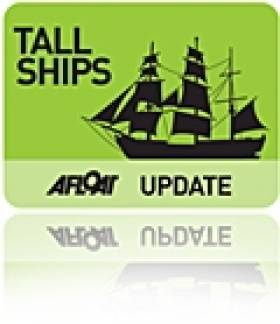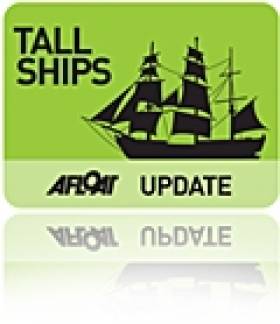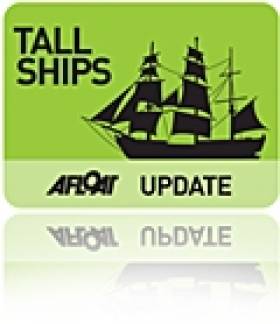Displaying items by tag: Spirit of Oysterhaven
Mediterranean Voyage of 'Spirit of Oysterhaven' Schooner
#tallships – Ireland's largest sail training vessel, the 70 foot schooner "Spirit of Oysterhaven", has recently completed her crossing of Biscay to Spain with a crew of seven under skipper Tom O'Leary. An intense high pressure system delivered 15 to 20 knots for the start of the voyage before dying to a windless calm, with Spirit quietly motoring through fields of phosphorescence at night and joined by dolphins on the bow-wave by day. Then by the
time she passed Cape Finisterre of the North West tip of Spain she was running at 9 knots before a force 7.
She is currently making her way down the Portuguese coast prior to rounding the Straits and then heading for Barcelona where she is due to participate in the Mediterranean Tall Ships Regatta at the end of September. "This is a very exciting event for us", commented owner Oliver Hart, " as we were invited to participate following our involvement in Dublin Tall Ships in 2012. We still have a few berths available on both voyages, and we are
looking for delivery crew to help us bring Spirit back to Alicante after the event."
The Mediterranean Tall Ships Regatta is a chance to join the Spirit of Oysterhaven for an unforgettable cruise in the company of a fleet of Tall Ships from Barcelona in Spain on Sunday 22nd September to Toulon in France and finishing in La Spezia in Italy on Sunday 6th October.
#tallships – A new venture for Oysterhaven Activity Centre in County Cork is its offering of adventure sail training on board the classic schooner Spirit of Oysterhaven. These 5 day voyages, designed either for youths (16 - 20 yrs olds) or adults start in Glandore and cruise the spectacular south coast, anchoring overnight in idyllic harbours of West Cork such as Castletownsend, Baltimore, Schull and Crookhaven.
Centre principal Oliver Hart says it is a great opportunity for aspiring sailors to get to know the ropes and sail on board the 70–foot classic schooner.
Crew members can expect to be fully involved in the sailing of the ship, from hoisting sails, to grinding winches to steering a course.
A highlight of previous voyages this summer has been rounding the Fastnet and a night sail back to Oysterhaven. As well as sailing the boat crew members will work together to produce meals, wash -up and keep the boat ship shape - useful skills to bring home!
Skipper Tom O'Leary is an experienced Yachtmaster Instructor and ensures that during the voyage crew members put into practice all the essential elements of sailing theory, from passage planning, to studying the weather, predicting tides and navigating to the desired destination.
August 12 - 16th and August 19 - 23rd
Cost € 450
Mediterranean Regatta
The Mediterranean Tall Ships Regatta is a chance to join the Spirit of Oysterhaven Trust Ltd for an unforgettable cruise in the company of a fleet of Tall Ships from Barcelona in Spain to Toulon in France and finishing in La Spezia in Italy.
With our focus on providing opportunities for disabled sailors to share the experience of sailing we have reserved two berths on each of the voyages. Funding is available for some crew members under the Sultan of Oman Bursaries, please contact for details.
Voyage 1 Sat 21st Sept - Friday 27th Sept. Barcelona - Toulon
After a festive Tall Ships event in Barcelona from September 21st to 23rd, the fleet sails for Toulon in France on Tuesday 24th September, arriving in Toulon on Friday 27th to enjoy a couple of days of French hospitality.
Voyage 2. Sat 28th Sept - Fri 4th Oct Toulon - La Spezia
Departing Toulon on Monday 30th September the fleet sails for Italy, arriving on the 4th October for a festive week-end in La Spezia.
Rates € 700 per person per voyage (€1,000 for 2 voyages)
Note that these voyages are run under the auspices of the Spirit of Oysterhaven Trust Ltd, a "not - for -profit" company established to promote education through sail training for young people of all abilities and social backgrounds. See http://www.spiritofoysterhavensailing.ie/spirit-of-oysterhaven-schooner-cork/spirit-trust
Milebuilding Voyage
Candidates considering doing their Yachtmaster exam any time soon may like the opportunity of logging some qualifying miles on a shared expenses basis. Spirit of Oysterhaven will be heading down to Portugal in late August. This 10–day voyage will give crewmembers the full experience of offshore sailing and ocean navigating. After the crossing of the Bay of Biscay Spirit will make a brief stop in Baiona, Spain before heading on down to Lagos in Portugal. This 1,000 mile 10 day voyage starts on August 28th and ends on 6th September.
Mid September Spirit sets out from the Algarve for a sunshine delivery cruise to Barcelona, with a brief stopover off at the Balearics - Mallorca and Minorca. This voyage is 750–miles and will involve more stops along the Spanish coast. Starts 12th September and ends in Barcelona on the 21st. Crewmembers may join for shorter sections of this passage.
#disabledsailing – A new initiative from sailing instructors at Oysterhaven Activity Centre in Cork aims to provide sailing opportunities for young people with disabilities on board the 70–foot schooner Spirit of Oysterhaven.
Spokesman Shane Dwyer described how last month the club members crewed the "Spirit" to the Cobh Traditional Sailing Regatta in Cork Harbour providing crewing opportunities for six young people who were restricted as a result of either sight impairment, cerebral palsy or height restriction.
The Spirit of Oysterhaven Trust is a youth initiative led and managed by young people from Oysterhaven Activity Centre, facilitated through the Léargas programme of funding for youth led initiatives.
The mission of the Trust is to provide an opportunity for those with an intellectual or physical disability the chance to experience sailing.
Dwyer explained, "The objective of the project is for us as crewmembers to develop our sailing and interpersonal skills while meeting the needs of the disabled sailors in our crew.
This is a challenge for both the able bodied members of our crew as well as the disabled members as we all learn to adjust to life aboard Spirit. "
The next event in the calendar is Glandore Classic Regatta where the crew of the Trust plans to participate in the Parade of Sail on Sunday 21st July after sailing down from Oysterhaven on the Friday evening.
You can follow progress on Twitter page @OysterhavenCrew and contact them by email [email protected]


























































